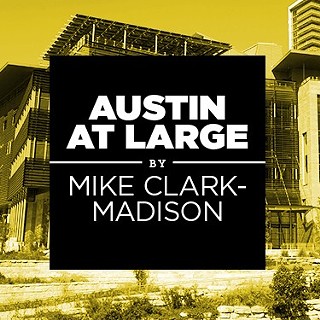Austin At Large: For the Price of a Policeman
The cost of public safety, in different community currencies
By Mike Clark-Madison, Fri., Aug. 23, 2019
We told you last week of the proposed fiscal year 2020 city budget's largest-ever investments to combat homelessness – Topic A all summer long, and one often framed as a core question of public safety. The budget also calls for 30 more police officers, in line with the five-year staffing plan Council first saw last year when Austin's police force was working without a contract. That changed in November amid much focus on both officer salaries (highest in the state) and newly empowered police oversight, but the Austin Police Department, the union, and their community champions also sought to lock in hiring increases, and City Manager Spencer Cronk has delivered.
So far, so good, from the perspective of a City Hall that wants to make genuine commitments to progressive justice – such as decriminalizing homelessness – while keeping things as chill as possible with pro-police constituencies. (The budget also directs new spending toward oversight, DNA testing of rape kits, victim counselors, and other public safety assets outside of officers' pay packets.) Considering how easily working relationships can go pear-shaped between APD brass, city management, the union rank-and-file, justice advocates, and the most activist Council on this front in my memory, an atmosphere of calm is not the worst thing.
Such calm may be conducive to doing something Austin has never done very well, no matter how much I nag: thinking clearly, compassionately, and pragmatically about how to spend each of the (as of FY 2020) $435 million we dedicate each year to our police department. Not just talk about it, pulling our chins and murmuring about "hard choices" and about how safety is the Council's first priority, and hoping everyone feels like they've been listened to, but actually thinking – how could we best use this very large and ever-increasing amount of money?
Moving Closer to Complete Answers
Saying that we need to use it for an ever-increasing number of cops to protect and serve an ever-increasing number of Austinites is not actually a complete answer. How do we spend this money on those people? On salaries, benefits, training, recruiting, diversity, community building, pay for performance ... what? Given the amount of money involved, the amount of energy we invest in maintaining police/community equanimity, and the amount of pain we feel when things go wrong, it seems like something that not just the insiders and experts and policymakers but all of Austin should feel free to think about.
When we do talk about the cost of safety, it's often at the least optimal times – in the teeth of tense contract talks or as a last-minute leitmotif in each year's budget drama or in the cold aftermath of horrible moments. Right now, events have conspired to, maybe, allow us to be less fitful or reactive. We have the ongoing homelessness crisis, in which we could afford to see our front-line officers less as bulwarks against disorder and more as sources of support and expertise. We have the hot light of scrutiny shining on how Austin handles sexual assault – some of it lighting up the D.A. (see "How Much Reform Is Enough in the Travis County District Attorney Race?") but a lot of it also glaring on APD, revealing things that need fixing no matter how one perceives the larger equity and justice context.
We have heard from justice advocates about how, maybe, we could reallocate funding now earmarked for new officers toward improved mental health crisis response training in the wake of an officer-involved fatality at a Downtown condo tower, of a man evidently having a psychotic break. Right now, this training is an add-on that allows officers (as part of the contract) to be paid more should they take it. Should it instead be a basic requirement for all officers, or should it be the full-time role of select officers who, thus, must be part of 24/7 staffing within each police command, or should it be something else?
Buying Time, Investing in the Future
We have also heard from our longtime comrade Scott Henson at Grits for Breakfast that we could hold off on those 30 new officers until we resolve the disquieting and, he says, rapidly deteriorating financial situation of the APD officer pension fund. Henson often rattles the press corps' cages pleading for us to cover things he cares about, but he's right that this should matter to the larger community, and that funding pension liabilities – again, an outcome of the contract – is a public safety cost.
The most succinct response to these questions of the moment is that adding police staffing buys us time – uncommitted time that officers can use to do the things that proactively keep community/police relations healthy as well as the streets safe. That's not a bad answer! But it's not the only one. Newspaper columnists have the luxury of saying, "Y'all should work this out," without being forced to take sides, which can be a cop-out. But we, as a community, should work this out. Over the last few years (I'd say "as a highlight of the 10-1 era"), we've gotten more mature and confident at trying to properly answer these thorny questions of civic life. We should keep doing it.
Got something to say? The Chronicle welcomes opinion pieces on any topic from the community. Submit yours now at austinchronicle.com/opinion.











